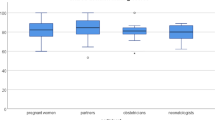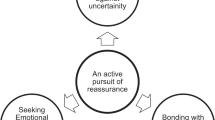Abstract
Objective
We tested whether mothers of neonates with Down syndrome (DS) prefer to get the diagnosis after delivery in a one-step approach or in a two-step one (information about suggestive findings, followed by additional explicit meeting).
Methods
Mothers were asked whether (1) they had been informed in one or two steps; (2) they would have preferred the other approach.
Results
Of 45 women who completed the questionnaires, 18 (40%) had been informed in a one step and 27 (60%) in two steps. Thirteen of the 18 mothers (72.2%) informed in one step were satisfied with the manner they had been informed, while 19 (70.4%) in the two-step group expressed satisfaction.
Conclusion
Mothers were generally satisfied with the method chosen with them. We speculate that an adaptive, supportive, empathic, caring and honest approach, taking into consideration family cultural and religious backgrounds may be able to optimize the delivery of such news.
This is a preview of subscription content, access via your institution
Access options
Subscribe to this journal
Receive 12 print issues and online access
$259.00 per year
only $21.58 per issue
Buy this article
- Purchase on Springer Link
- Instant access to full article PDF
Prices may be subject to local taxes which are calculated during checkout
Similar content being viewed by others
References
Monden KR, Gentry L, Cox TR. Delivering bad news to patients. Proc Bayl Univ Med Cent. 2016;29:101–2.
The NIH U.S. National Library of Medicine, Genetic Home Reference. Down syndrome; 2019. https://ghr.nlm.nih.gov/condition/down-syndrome#diagnosis.
Wasant P, Rajchagool C. Down syndrome parents’ support group in Thailand Siriraj Hospital, fifteen years experience: a review. J Med Assoc Thai. 2009;92:1256–62.
Skotko BG, Capone GT, Kishnani PS, Down Syndrome Diagnosis Study Group. Postnatal diagnosis of Down syndrome: synthesis of the evidence on how best to deliver the news. Pediatrics. 2009;124:e751–8. https://doi.org/10.1542/peds.2009-0480
Skotko B. Mothers of children with Down syndrome reflect on their postnatal support. Pediatrics. 2005;115:64–77.
Khorfan R, Padela AI. The bioethical concept of life for life in Judaism, Catholicism, and Islam: abortion when the mother’s life is in danger. JIMA. 2010;42:99–105.
Dent KM, Carey JC. Breaking difficult news in a newborn setting: Down syndrome as a paradigm. Am J Med Genet C Semin Med Genet. 2006;142C:173–9.
Karam VY, Barakat H, Aouad M, Harris I, Park YS, Youssef N, et al. Effect of a simulation-based workshop on breaking bad news for anesthesiology residents: an intervention study. BMC Anesthesiol. 2017;17:77.
Author information
Authors and Affiliations
Contributions
MSS assisted in all aspects of the study conception, design, and organization, data collection and in writing the paper. TMY assisted in organization and data collection, FBM assisted in conception and analysis of data and in writing of the paper, and NW assisted in conception, organizing, and analyzing the data and in writing the paper. All authors reviewed the paper for important intellectual contents and approved the final version. All authors agree to be accountable for all aspects of the work.
Corresponding author
Ethics declarations
Conflict of interest
The authors declare that they have no conflict of interest.
Additional information
Publisher’s note Springer Nature remains neutral with regard to jurisdictional claims in published maps and institutional affiliations.
Rights and permissions
About this article
Cite this article
Schimmel, M.S., Mimouni, F.B., Yosef, T.M. et al. “Your baby has Down syndrome”: what is the preferable way to inform parents?. J Perinatol 40, 1163–1166 (2020). https://doi.org/10.1038/s41372-020-0701-6
Received:
Revised:
Accepted:
Published:
Issue Date:
DOI: https://doi.org/10.1038/s41372-020-0701-6



